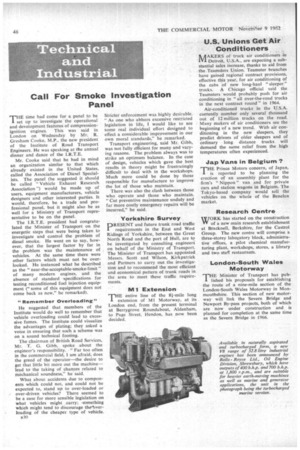Call For Smoke Investigation Panel
Page 48

If you've noticed an error in this article please click here to report it so we can fix it.
rrHE time had come for a panel to be set up to investigate the operational and development features of compressionignition engines. This was said in London on Wednesday by Mr. R. Gresham Cooke, M.P., the new president of the Institute of Road Transport Engineers. He was speaking at the annual dinner and dance of the I.R.T.E.
Mr. Cooke said that he had in mind an organization similar to that which already existed in the United States, called the Association of Diesel Specialists. The panel (he suggested it should be called "Vehicle Exhaust Research Association ") would be made up of users, equipment manufacturers, vehicle designers and other interested parties. It would, therefore, be a trade and professional panel, but it might also be as well for a Ministry of Transport representative to be on the panel.
The 1.R.T.E. president had congratulated the Minister of Transport on the energetic steps that were being taken to investigate and control the problem of diesel smoke. He went on to say, however, that the largest factor by far in the problem was the maintenance of vehicles. At the same time there were other factors which must not be overlooked. He instanced what he described as the " near-the-acceptable-smoke-limit " of many modern engines, and the absence of standard specifications for testing reconditioned fuel injection equipment (" some of this equipment does not come back as new." he remarked).
"Remember Overloading" He suggested that members of the Institute would do well to remember that vehicle overloading could lead to excessive fumes. The Institute could visualize the advantages of plating; they asked a voice in ensuring that such a scheme was on a sound technical footing.
The chairman of British Road Services, Mr. T. G. Gibb, spoke about the engineer's responsibility. "Far too often in the commercial field, I am afraid, does the greed of the operator—the desire to get that little bit more out the machine— lead to the taking of chances related to mechanical soundness," he said.
What about accidents due to components which could not, and could not be expected to, stand up to over-loaded or over-driven vehicles? There seemed to be a case for more sensible legislation on what vehicles might carry; something which might tend to discourage thcrtverloading of the cheaper type of vehicle.
n30 Stricter enforcement was highly desirable. "As one who abhors excessive restricted legislation in life, I would like to sec some real individual effort designed to effect a considerable improvement in our own moral standards," he remarked.
Transport engineering, said Mr, Gibb, was not fully efficient for many and varying reasons. The problem always was to strike an optimum balance. In the case of design, vehicles which gave the best results in theory might be frustratingly difficult to deal with in the workshops. Much more could be done by those responsible for manufacture to improve the lot of those who maintain.
There was also the clash between those who operate and those who maintain. "Cut preventive maintenance unduly and far more costly emergency repairs will be incurred," he said.
Yorkshire Survey.
PRESENT and future trunk road traffic requirements in the East and West Ridings of Yorkshire, between the Great North Road and the port of Hull, are to be investigated by consulting engineers on behalf of the Ministry of Transport. The Minister of Transport has appointed Messrs. Scott and Wilson, Kirkpatrick and Partners to carry out the investigation and to recommend the most efficient and economical pattern of trunk roads in the area to meet these traffic requirements.
M1 Extension
THE entire line of the 8-I-mile long extension of MI Motorway, at its London end, from the present terminal at Berrygrove Roundabout, Aldenham, to Page Street, Hendon, has now been decided.












































































































